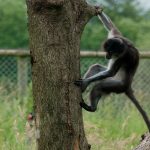New Members To The Troop

We are proud to announce the arrival of 2 new members to our ring-tailed lemur troop. Ruth, our matriarch (the boss of the troop) has given birth to a very healthy infant and Pandora has also given birth.
Here at the zoo, we were all very excited to see the babies clinging on to their mothers’ bellies. The babies are now beginning to move around their mother and begin to ride on her back when they are foraging.
Ring-tailed lemurs are classified as “near threatened” by the IUCN (the international body that researches the risk of species going extinct). Due to this “near threatened” classification, the births are another triumph in Flamingo Land’s breeding of endangered and threatened species.
Ring-tailed lemurs breed well and twins are not uncommon both in captivity and in the wild. So why is their existence “near threatened” in the wild? Habitat loss is unfortunately the main threat to ring-tailed lemurs. Madagascar is the fourth largest island in the world. On land area it is approximately 2 and a half times the size of the UK! But aerial pictures illustrate the full extent of the destruction of its unique forests. Destruction due to slash and burn agriculture, logging of trees and over-grazing by livestock are all taking their toll.
So what can people do? Are lemurs destined to be a species of the past? Conservation teams are working hard to bring hope to the forests of Madagascar which are home to a wide range of unique species. One of the main areas in which they are focusing on is the illegal logging of Madagascan hardwoods such as ebony and rosewood. These woods are prized in the international market reaching prices of £2000 a tonne. Through campaigns urging people to be aware of where their wood/furniture comes from and aware of buying illegal wooden souvenirs on holidays is hoping to stem the flow of wood coming out of the biodiversity hotspot that is Madagascar.


